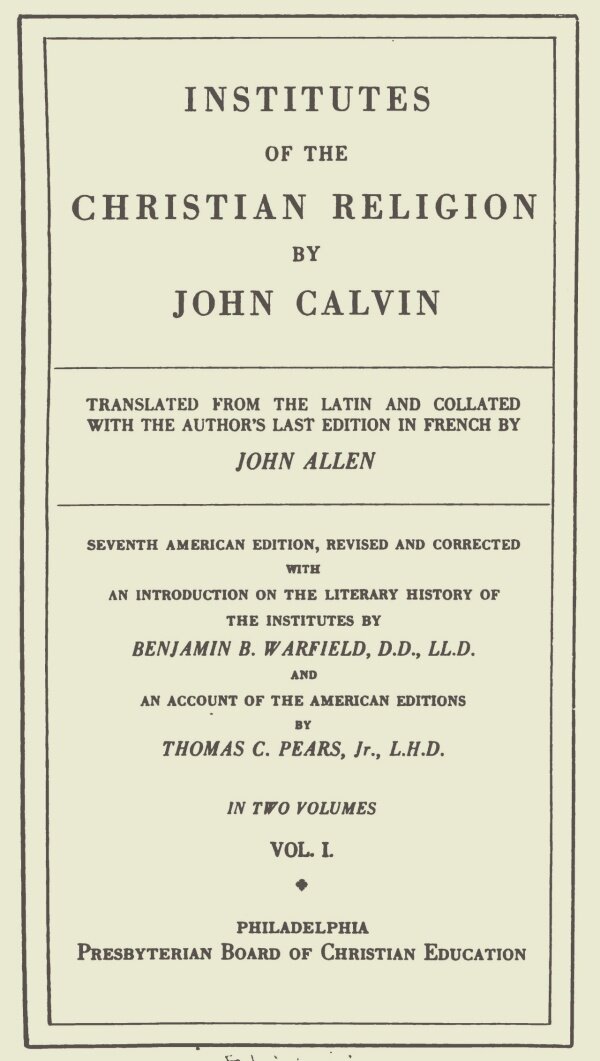(Receive our blog posts in your email by clicking here. If the author links in this post are broken, please visit our Free PDF Library and click on the author’s page directly.)
Now, my design in this work has been to prepare and qualify students of theology for the reading of the divine word, that they may have an easy introduction to it, and be enabled to proceed in it without any obstruction. For I think I have given such a comprehensive summary, and orderly arrangement of all the branches of religion, that, with proper attention, no person will find any difficulty in determining what ought to be the principal objects of his research in the Scripture, and to what end he ought to refer any thing it contains. — John Calvin, Preface to the 1559 edition of the Institutes of the Christian Religion (1841 ed.)
One of the great classic works in Reformed Christian literature is the Institutes of the Christian Religion by the French-Swiss theologian John Calvin. First published in Latin in 1536, with subsequent editions in Latin and French, the final authoritative Latin edition approved by its author came out in 1559. It’s importance as a guide to the Christian faith can be measured in how many times it has been republished, including in America. Perhaps more than any other single book, Calvin’s Institutes has influenced and shaped the Protestant Reformation and Protestantism in general.
Today, in the English-speaking world, the most commonly used translations are those by Ford Lewis Battles (edited by John T. McNeill, 1960) and Henry Beveridge (1845), although more recent. translations from the 1541 French edition of the Institutes (Calvin’s own translation of the 1539 Latin Institutes into French) by Elsie Anne McKee (2009) and Robert White (2014) are gaining in popularity. Older English translations by Thomas Norton (1561) and John Allen (1813) continue to have their respective admirers; Calvin scholar Dr. Richard Muller is said to prefer Allen’s over the rest.
Although the first American edition was published in 1816, it was not until overtures by John C. Backus and Robert J. Breckinridge on behalf of their Baltimore congregations, with financial assistance, led the Presbyterian Board of Publication to issue its own edition of Allen’s translation in 1841 with an introduction by William M. Engles, editor of the Board, along with editorial assistance by his brother Joseph P. Engles.
Title page of the 1841 edition of Calvin’s Institutes.
In 1936, a new edition of Allen’s translation was published by the Presbyterian Board of Christian Education. It has some features worthy of note. Included are B.B. Warfield’s article on The Literary History of the Institutes (first published in 1909) and An Account of the American Editions by Thomas C. Pears, Jr.
Title page of the 1936 edition of Calvin’s Institutes.
It is hoped that we might be able to add Hugh T. Kerr’s A Compend of the Institutes of the Christian Religion (1939) at some point in the future. Meanwhile, the 1841 and 1936 editions of Calvin’s Institutes, with prefatory material by Engles, Warfield and Pears are fully available to read at Log College Press. Allen’s translation of Calvin’s magnum opus is a treasure appreciated by American Presbyterians since the 19th century, and we are pleased to make it accessible to our 21st century readers as well.
It has pleased God that Calvin should continue to speak to us through his writings, which are so scholarly and full of godliness, it is up to future generations to go on listening to him until the end of the world, so that they might see our God as he truly is and live and reign with him for all eternity. — Theodore Beza, Life of John Calvin




